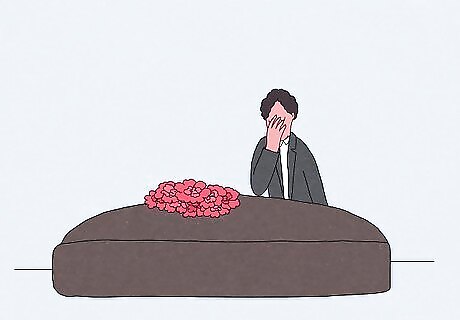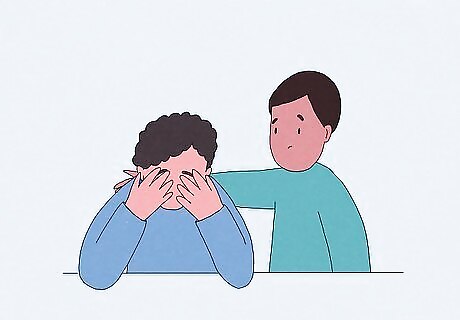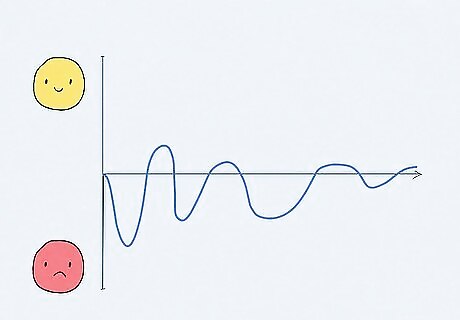
views
Process your emotions.

Everybody reacts differently to goodbyes. You might feel sad, angry, or lonely. You might even feel relieved that the relationship was over, especially if it was difficult or complicated—and that, in turn, might make you feel guilty. No matter how you feel, don't label your emotions as "good" or "bad." They're all a natural part of saying goodbye, so just acknowledge what you're feeling and be kind to yourself as you deal with the moment. Let your emotions out however you need to, as long as it's healthy. For instance, if you're sad and you feel like crying, give yourself some time to cry. If you're mad, write out your feelings in a letter or release your anger physically by going for a run.
Tell the person how much they mean to you.

Let them know how important they are. When you're preparing to say goodbye to someone, talk to them about the impact they've had on your life. Be as specific as possible by sharing memories and talking about decisions you've made that they might have impacted. For instance, you might say, "Do you remember how much fun we had making cookies when I was a kid? That was when I discovered how much I loved being in the kitchen, and it's the reason I'm a chef today." You could also say something like, "You've always been such a supportive, fun friend. I try to be like you every day!"
Apologize or forgive them if you need to.

Mend old hurts before you say goodbye. If there's anything that needs to be said to clear the air, now's the time to do it. If you know you hurt the person in the past, or if there's something you didn't do and wish you had done, give them a heartfelt apology. And if you've been holding on to any resentment, let go of it, and let the other person know you forgive them for it. For instance, you might say, "I'm sorry I wasn't around much the last year. I was really focused on work, but I should have made more time for you." Or, you might say, "Dad, I know you did the best you could. I forgive you for not being there when I was little, and I'm grateful that we have time together now." Be thoughtful before sharing something that might be hurtful—think about whether the other person really needs to know, or if you're just trying to clear your conscience. For instance, if your best friend is moving away for good, do you really need to tell her about the time you secretly kissed her brother?
Hold a farewell ceremony.

This can be helpful if you couldn't say goodbye in person. If a relationship ended abruptly or a loved one died unexpectedly, you might not have had enough time for the goodbye you wanted. That lack of closure can make it hard to move on. Funerals, wakes, and memorial services are all important ways to get closure when a loved one dies. However, you may also want to hold your own private ceremony where you say goodbye in your own way. Try writing a letter to the person who's gone and read it out loud in a place where you feel close to them. You can then tear up the letter, burn it, or put it in a drawer. If a relationship ended, you might have a ceremony where you box up old photos and mementos, then burn them or throw them away.
Focus on happy memories.

Be grateful for the time you had with them. Goodbyes are really hard, and it's okay if you feel sad about that. Try not to let that overshadow the relationship you had, though. Instead, think about fun times you had together, and reflect on the positive impact they had on your life. Try saying something like, "I have a lot of complicated feelings about this that I'm still trying to work through, but I just want you to know that I'll always value the good memories we shared together." You can even look for the good that can come from saying goodbye. For instance, caring for your parent at the end of your life might have given the two of you a chance to heal old wounds before they passed. Similarly, the end of a marriage might have opened the door for you to find a new, healthier romance. If you can, try to spend time building new, positive memories with the person before you have to say goodbye.
Lean on your support system.

Tell the people around you what you need. Don't try to struggle through this on your own. Reach out to the people in your life who make you feel supported and cared for, and let them know what you're going through. Be open about how they can help you, too. For instance, you could say something like, "Since Ben left, I don't know how to fill my time. Could we meet up one afternoon this week?" If you just want someone who will be there to listen, say, "I was wondering if I could just talk to you about how I'm feeling for a little while." If there's no one around you feel comfortable talking to, try looking up a local support group for people who are grieving, or join one online.
Take all the time you need to grieve.

Grieving a loss can be a long process. It's not linear, either. You might feel fine one moment, then be overwhelmed the next. Keep in mind that's totally normal, and there's no set timetable for when you should start to feel better. In fact, there might always be a part of you that feels sad over this loss, and that's okay. Just keep taking care of yourself, and don't let the pain stop you from forming new, healthy relationships in the future.
Occupy yourself with other things.

Fill your time with hobbies and activities you enjoy. It's okay to take a little time to just feel sad, but eventually, it's really important to get back into your own life. If you're losing a relationship that was a major part of your life, you might have to figure out what that looks like from a new perspective. Luckily, by immersing yourself in the things that make you happy, you can help your life feel full and meaningful again. Try reading a book, meeting up with an old friend for coffee, taking a class, or taking up a side hustle.
Talk to a therapist.

A professional can help you work through complicated feelings. If you're struggling with feelings of grief, loss, or anger after you say goodbye to someone you love, understand that you don't have to go through that alone. Meeting with a therapist—especially one trained in grief—is a great way to sort out your emotions and get a fresh perspective on what happened. They can also help you learn techniques to start the process of healing and moving on.




















Comments
0 comment